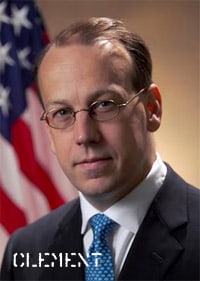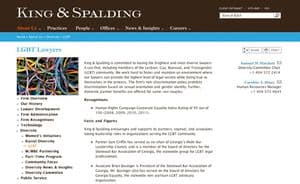Follow Ari on Twitter at @ariezrawaldman.
 After President Barack Obama decided that his administration will no longer defend the Defense of Marriage Act (DOMA), the Republican-controlled House of Representatives chose Paul Clement, a former solicitor general in the administration of President George W. Bush, to step in. At the time, Mr. Clement was a partner at the large firm King & Spalding LLP, billing at more than $500 per hour and eager to take on the defense. When he retained Mr. Clement, Speaker John Boehner insisted on a "gag rule" that would have barred all K&S attorneys and staff from being involved in anything or saying anything that could be seen as opposing DOMA. But, almost as suddenly as Mr. Clement took the reins did King & Spalding reverse course, declining to take the case and forcing Mr. Clement to flee to the conservative Bancroft firm to continue his representation of the House.
After President Barack Obama decided that his administration will no longer defend the Defense of Marriage Act (DOMA), the Republican-controlled House of Representatives chose Paul Clement, a former solicitor general in the administration of President George W. Bush, to step in. At the time, Mr. Clement was a partner at the large firm King & Spalding LLP, billing at more than $500 per hour and eager to take on the defense. When he retained Mr. Clement, Speaker John Boehner insisted on a "gag rule" that would have barred all K&S attorneys and staff from being involved in anything or saying anything that could be seen as opposing DOMA. But, almost as suddenly as Mr. Clement took the reins did King & Spalding reverse course, declining to take the case and forcing Mr. Clement to flee to the conservative Bancroft firm to continue his representation of the House.
This was a pretty remarkable story, with at least three lessons. This drama is not really about wanting the best defense for DOMA — it should, and will, get a vigorous defense despite this saga; rather, it is about (1) the role of public money in squelching speech and (2) the responsibilities of large law firms. Most importantly, this hiccup in the House's defense of DOMA illustrates the progress we have made in the court of public opinion and the reason why persuading hearts and minds is the real battle.
Some thoughts on how House Republicans overplayed their hands and created free speech concerns, the (admittedly belated) ordinariness of K&S's ultimate decision and the importance of public opinion AFTER THE JUMP…
Given that House Republicans have found the need to defend DOMA, many believe it should get the best defense possible. House Republicans should bring their A-game, lest our victory seem illegitimate, like Mike Tyson going after Carol Channing (though, as seen here, Seth MacFarlane thinks that analogy is inapt). This is an uninteresting conclusion.
More important is the proposed "gag rule." The agreement signed by Mr. Clement would have silenced everyone at K&S, preventing anyone from voicing any opposition to DOMA, stating that “partners and employees who do not perform services pursuant to this Agreement will not engage in lobbying or advocacy for or against any legislation … that would alter or amend in any way the Defense of Marriage Act and is pending before either the U.S. House of Representatives or the U.S. Senate or any committee of either body during the term of the Agreement.”
Not only is that ridiculous — it would be like a firm that represents a tobacco company barring its employees from telling people not to smoke — and of dubious First Amendment merit — admittedly, I know of no free speech case on point in which public money was paid to a private firm to perform a consulting service for the government and included a comprehensive evisceration of employee speech, but related case law on private employee speech rights suggest that such a rule would violate employee First Amendment rights — it is incompatible with how law firms work. The wide reach of large law firms and the diverse clientele that comes with such size mean that one firm, even one office, may represent clients whose interests do not always align on a particular case. In those instances, firms set up "walls" to fulfill their ethical obligations and avoid even the hint of a conflict of interest. There is no reason why representation of the Republican House in defense of DOMA would require more than that, allowing the firm to defend DOMA and, for example, represent amici who support marriage equality in the Prop 8 case. Instead, Mr. Clement and House Republicans applied a free-speech-as-long-as-you-agree-with-us mentality.
That said, there is nothing extraordinary about K&S's ultimate decision to drop the DOMA defense. While firms do set up walls within offices, it is only natural that certain types of clients gravitate toward certain firms, while their perennial foes gravitate toward others. There are plaintiffs' firms, union-side labor lawyers and lawyers that exclusively represent record labels just like there are defense firms, management-side labor lawyers and lawyers that represent musicians or music consumers. Therefore, it is only natural for a firm like K&S to decide that a given client does not fit within the firm's broader ethos. K&S, like many of its fellow top-tier firms and its clients have made a very public commitment to diversity. And, as my distinguished colleague (and Towleroad reader) Professor Chuck Knapp at UC Hastings School of Law noted to me, firms like K&S can make the legitimate decision that defending DOMA is simply incompatible with the firm's and its clients' goal of fostering tolerance and acceptance in the workplace.
The gag rule would also have been illegal in at least some of the states where K&S has set up shop. New York, for example, has a law that states…
Unless otherwise provided by law, it shall be unlawful for any employer or employment agency to refuse to hire, employ or license, or to discharge from employment or otherwise discriminate against an individual in compensation, promotion or terms, conditions or privileges of employment because of: … an individual's political activities outside of working hours, off of the employer's premises and without use of the employer's equipment or other property, if such activities are legal …
Similar rules in California and other states may have made the gag rule a non-starter.
 This shows the importance of diversity initiatives and diversity commitments in the private sector. Many poo-poo diversity manifestos as little more than a piece of paper new hires receive on their first day and either file away under "Never Read" or toss in the trash. But, to many companies competing for the best minds, minority protections and diversity are essential to getting their recruiters on campus and persuading the best students to join their ranks. If this diversity goal was not part of the ethos of K&S and its clients, CocaCola would never have pressured K&S to drop the case and the Human Rights Campaign would have had no leg to stand on when it pressured K&S and its clients.
This shows the importance of diversity initiatives and diversity commitments in the private sector. Many poo-poo diversity manifestos as little more than a piece of paper new hires receive on their first day and either file away under "Never Read" or toss in the trash. But, to many companies competing for the best minds, minority protections and diversity are essential to getting their recruiters on campus and persuading the best students to join their ranks. If this diversity goal was not part of the ethos of K&S and its clients, CocaCola would never have pressured K&S to drop the case and the Human Rights Campaign would have had no leg to stand on when it pressured K&S and its clients.
But it seems unlikely that this commitment to diversity would have trumped broad public opinion. If it were 1996, when marriage equality was supported by less than 25% of the public according to some polls, Coca-Cola may not have been as willing to run out on a limb and ask K&S to reconsider its defense of DOMA. (It certainly would have made the company less vocal and public about its behind the scenes maneuvers.) The erstwhile Mr. Clement's termination of his relationship with K&S was, at least in part, made possible by the change in public opinion in favor of marriage equality. For years, we have been working to show our straight friends that their gay neighbors are just like them and the growing majorities that support marriage equality are proof that the strategy is working.
Public opinion, together with the private sector's commitment to diversity as a means to attract the best and brightest, made this story. House Republicans and Mr. Clement made a mistake: they overplayed a losing hand. And, by defending an indefensible law, they will just keep losing.



